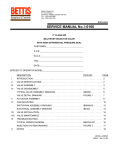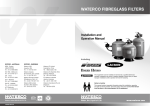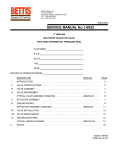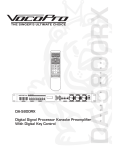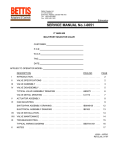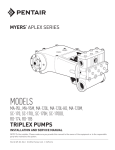Download Emerson Process Management I-0320 Oxygen Equipment User Manual
Transcript
Bettis Canada Ltd. 4112-91A Street Edmonton, Alberta Canada T6E 5V2 Tel: 780-450-3600 Fax: 780-450-1400 SERVICE MANUAL No. I-0320 MULTIPORT FLOW SELECTOR CUSTOMER: P.O. # W.O. # TAG: DATE: OPERATOR MODEL I-0320--.DOC/1 REV 1: AUG-31-04 (I-0320--.doc/1) 1 TABLE OF CONTENTS I INTRODUCTION ........................................................................................................................................... 4 II MULTIPORT SPECIFICATIONS................................................................................................................ 4 IIB ACTUATOR SPECIFICATIONS:................................................................................................................ 5 III MULTIPORT INSTALLATION................................................................................................................... 6 IIIB FIELD TECHNICIAN COMMISSIONING ACTIVITIES ........................................................................ 6 A. REINSTALLATION OF THE ACTUATOR ASSEMBLY (also refer to section VII) ............................. 6 B. HOME PORT CALIBRATION (I-0168/RD-00232 Section H)................................................................... 7 C. MULTIPORT ELECTRONIC CONTROLLER SET UP........................................................................... 7 IV MULTIPORT MAINTENANCE................................................................................................................... 8 V MULTIPORT ASSEMBLY............................................................................................................................ 8 A. BODY: (110) .................................................................................................................................................... 8 B. PLUG: (130) .................................................................................................................................................... 8 C. BONNET: (162)............................................................................................................................................... 9 D. PLUG SEAL ADJUSTMENT (162): ........................................................................................................... 10 VI MULTIPORT DISASSEMBLY................................................................................................................... 11 VII ACTUATOR ASSEMBLY ........................................................................................................................... 11 A. Pedestal, Connector, Speed Reducer, and Motor ....................................................................................... 11 B. Local Stepping Command Electrical Conduit, Switchpak Pedestal, and Connector .............................. 12 VIII TROUBLESHOOTING ............................................................................................................................... 13 IX DRAWINGS .................................................................................................................................................. 14 X TYPICAL MULTIPORT SEAL COMPONENTS ..................................................................................... 20 XI MULTIPORT FLOW SELECTOR NOTES .............................................................................................. 23 APPENDIX 1: MOTORS............................................................................................................................................. 24 A: Baldor Motors..................................................................................................................................................... 24 B: Elnor Motors ....................................................................................................................................................... 27 C: Pacific Scientific Motors .................................................................................................................................... 32 APPENDIX 2: GEAR REDUCERS ............................................................................................................................ 36 A: Morse Gearbox ................................................................................................................................................... 36 B: Boston Gear Gearbox ......................................................................................................................................... 39 C: Baldor Gearbox .................................................................................................................................................. 47 Additional manuals: Multiport Electronic Controller Model MP-08 – Service Manual I-0168 Multiport Electronic Controller Model MP-800 – Service Manual RD-00232 (I-0320--.doc/2) 2 OBSERVE ALL WARNING DECALS AND TAGS MINIMUM TOOLS REQUIRED: A torque wrench, socket wrench, and allen head wrenches are required to install the Multiport and Actuator assembly. NPS 2” NPS 3” ANSI 600 NPS 3” ANSI 900/1500 NPS 4” ANSI 600 NPS 4” ANSI 900 1 7/16” 2” 2 3/8” 2 3/8” 2 9/16” MULTIPORT SIZE BONNET NUT SOCKET SIZE Other socket sizes required: 7/16", 1/2", 9/16", 3/4", 1 1/8". Allen key sizes required: 5/32", 1/4". Wrench sizes for Multiport flanges: ANSI RATING NPS 2 NPS 3 NPS4 NPS 6 NPS 8 300 1 1/16 - 600 1 1/16 1 1/4 1 7/16 1 5/8 1 13/16 900 1 7/16 1 13/16 1 13/16 2 3/16 1500 1 13/16 2 2 3/16 - (I-0320--.doc/3) 3 I INTRODUCTION As many as eight flow-lines can be manifolded through one BETTIS Multiport Flow Selector. The multiport allows diversion of an individual flow-line to a test outlet for testing or sampling, while combining the flow of the other flow-lines into a separate group outlet. II MULTIPORT SPECIFICATIONS RATING SIZE MAXIMUM WORKING PRESSURE PSIG WORKING TEMP ΕC STD. 740 38 HIGH TEMP 600 260 STD. 740 38 HIGH TEMP 600 260 TRIM RATING TRIM WORKING TEMP ΕC STD. 1000 200 HIGH TEMP 1440 260 STD. 1440 38 HIGH TEMP 1200 260 STD. 1480 38 HIGH TEMP 600 260 RATING WORKING TEMP ΕC STD. 2220 38 HIGH TEMP 1795 260 STD. 2220 38 HIGH TEMP 1795 260 RATING TRIM ONE TEST OUTLET PORT ONE GROUP OUTLET PORT MULTIPORT 3x6 NPS 3 NPS 3 NPS 6 800 4x8 NPS 4 NPS 4 NPS 8 1275 ANSI 600RF CONNECTION NPS WORKING TEMP ΕC STD. 3705 38 HIGH TEMP 2995 260 WEIGHT ONE TEST OUTLET PORT ONE GROUP OUTLET PORT MULTIPORT 2x4 NPS 2 NPS 2 NPS 4 180 3x6 NPS 3 NPS 3 NPS 6 860 4x8 NPS 4 NPS 4 NPS 8 1375 ANSI 900RF CONNECTION NPS lbs. WEIGHT EIGHT FLOWLINE INLET PORTS ONE TEST OUTLET PORT ONE GROUP OUTLET PORT MULTIPORT 3x6 NPS 3 NPS 3 NPS 6 1800 4x10 NPS 4 NPS 4 NPS 10 3200 SIZE MAXIMUM WORKING PRESSURE PSIG lbs. EIGHT FLOWLINE INLET PORTS SIZE MAXIMUM WORKING PRESSURE PSIG WEIGHT EIGHT FLOWLINE INLET PORTS NPS SIZE MAXIMUM WORKING PRESSURE PSIG TRIM ANSI 300RF CONNECTION ANSI 1500RF CONNECTION NPS 3x6 (I-0320--.doc/4) 4 lbs. WEIGHT EIGHT FLOWLINE INLET PORTS ONE TEST OUTLET PORT ONE GROUP OUTLET PORT MULTIPORT NPS 3 NPS 3 NPS 6 1875 lbs. MULTIPORT SIZE AND RATING NPS 2" ANSI 600 NPS 3" ANSI 600 NPS 3" ANSI 900/1500 NPS 4" ANSI 600 NPS 4" ANSI 900 TEST OUTLETCV 67 151 100 270 218 GROUP OUTLET CV 262 594 429 1040 830 SHELL HYDROSTATIC TEST PRESSURE PSIG (KPa) 2200-2220 (13780-15300) 2160 (14900) 5560 (38310) 2220 (15300) 3330 (22950) MAXIMUM DYNAMIC DIFFERENTIAL PSID @ 40ΕC MULITPORT SIZE AND RATING STATIC STATIONARY DIFFERENTIAL PSID @ 40ΕC TEST-GROUP GROUP-TEST TEST-GROUP GROUP-TEST NPS 2X4 ANSI 600 600 550 1200 900 NPS 3X6 ANSI 60 500 450 1000 700 NPS 3X6 ANSI 900/1500 500 450 1000 700 NPS 4X8 ANSI 600 400 350 800 600 NPS 4X10 ANSI 900 400 350 800 600 Note: In Emergency situations only, the Multiport Flow Selector seal can maintain STATIC STATIONARY DIFFERENTIAL pressure rating per specifications above. However, do not operate the motor operator at greater than the MAXIMUM DYNAMIC DIFFERENTIAL pressure rating because damage may occur to the motor operator. IIB ACTUATOR SPECIFICATIONS: MULTIPORT SIZE AND RATING NPS 2" ANSI 600 NPS 3" ANSI 600 NPS 3" ANSI 900/1500 NPS 4" ANSI 600 NPS 4" ANSI 900 PLUG POSITION TOLERANCE +/- 2Ε +/- 2Ε +/- 2Ε +/- 2Ε +/- 2Ε BREAKAWAY TORQUE @ MAX DIFFERENTIAL 100-125 FT-LBS 100-170 FT-LBS 150-200 FT-LBS 150-210 FT-LBS 150-210 FT-LBS ACTUATOR SPEED 1.4 RPM 1.4 RPM 1.4 RPM 1.4 RPM 1.4 RPM ACTUATOR WEIGHT 50 LBS 130 LBS 130 LBS 130 LBS 150 LBS PLUG POSITION ACCURACY +/- 1Ε +/- 1Ε +/- 1Ε +/- 1Ε +/- 1Ε (I-0320--.doc/5) 5 III MULTIPORT INSTALLATION Before installing the unit, observe all warning tags and: 1. Check for external physical damage. 2. Check for any visible leakage of gear oil from the speed reducer (426). 3. Visually inspect the inside of the multiport through the group outlet port checking for damage, rust, and debris. 4. Check the wiring arrangement using the attached diagram on page 17 or as supplied for a particular order/unit. 5. Verify the voltage requirement of the motor (AC/DC) and connect power supply and signal circuits to test the operation of the motor (438) and plug. Check for proper plug seal alignment at each port. NOTE: The Multiport Flow Selector plug seal/port alignment is factory adjusted when supplied with actuator and should not require further adjustment. 6. Connect piping. NOTE: When hydrotesting external piping, position the plug between any two inlet ports in order to equalize test pressure between the multiport body and external piping and prevent possible seal damage from occurring. IIIB FIELD TECHNICIAN COMMISSIONING ACTIVITIES Refer to the Multiport Electronic Controller service manual I-0168 for detailed commissioning activities. CAUTION: The valve body may be pressurized from hydrostatic testing - do not remove any bolts or flanges for inspection until after the unit has been depressurized. The connector and pointer are potential pinch points for fingers when the unit is rotating - keep hands clear of the unit during operation. Circuit boards are susceptible to damage from static discharge when touched - ensure that you ground yourself before touching the JOG, ZERO, and HOME buttons on the electronic controller board. NOTE: Locate the reference mark (a centre punch mark) on the flat section of the stem to indicate the orientation of the plug seal. The mark should be visible between the flats of the lower section of the connector when assembly is completed and is to be used as a reference indicating the plug seal location in the body (See photo, page 22). A. REINSTALLATION OF THE ACTUATOR ASSEMBLY (also refer to section VII) NOTE: The indicator plate (402) must be set in place as the motor/gearbox is lowered onto the valve body. 1. Using a manual wrench, rotate the plug assembly two or three revolutions to verify that it turns freely. Initial effort required to turn the plug may be high as the seal will typically acquire some set from sitting for extended periods of time. Turn the plug until the reference mark is aligned (I-0320--.doc/6) 6 with the #6 well connection. This allows for the installation of the connector pin. Note that installing the pin may require electrical power so that the upper section of the connector can be rotated to align the bolt hole. 2. Install the lower section of the connector onto the stem flat. Orient the lower section of the connector so that the indented mark is visible between the flats. 3. Install the two studs (1/2NC) diagonally opposite one another (180° apart). 4. Lower the actuator assembly over the studs, placing the indicator plate over the studs. Lower the actuator assembly until it rests on the bonnet. 5. Install the two bolts (1/2NC X 1.25LG) to secure the assembly to the bonnet. 6. Install the lower nuts on the studs. 7. Tighten all bolts and nuts finger tight only. 8. With the connector sections aligned, install the connector bolt. Note that this may require electrical power to rotate the connector and align bolt holes. 9. Install the spacers, indicator plate, and upper nuts on the studs. Leave the nuts loose, to be tightened later when alignment is completed (step 11, below). 10. Wrench tighten the two bolts and lower nuts. NOTE: Refer to electrical drawings and wiring diagrams for electrical power terminal connection and motor voltage. 11. After connecting power to the motor, rotate the plug two revolutions to align the connectors. Visually check for any binding and adjust as necessary. After ensuring correct alignment, wrench tighten all bolts and nuts. B. HOME PORT CALIBRATION (I-0168/RD-00232 Section H) 1. Using the JOG button, align the connector sections to install the connector bolt and tighten the connector set screw. 2. If possible, remove the blind flange on the home port (port #8) and use the JOG button (tap briefly for fine movement of the plug) on the controller circuit board to “fine tune” the plug seal/port alignment. 3. Follow the procedure in the Multiport Electronic Controller Manual for home port calibration (set zero). 4. When finished, align the hex corner of the lower connector with the appropriate slot on the indicator plate. The pointer should also line up with the slot on the indicator plate. 5. If the unit has the optional local control push button station, select step mode and press the button. The plug should move automatically to the next available port and slowly step into position. Verify this by observing the hex connector and the slot in the indicator plate. MULTIPORT ELECTRONIC CONTROLLER SET UP C. Refer to the MEC service manual I-0168 for detailed instruction on: 1. Disabling port positions (I-0168 Section I). (I-0320--.doc/7) 7 2. Controller address (I-0168 Section J). 3. Control room MODBUS RTU operation (I-0168 Section D). 4. Installation and use of Bettis Multiport Electronic Controller software on laptop PC. MULTIPORT MAINTENANCE IV Refer to the typical multiport assembly drawing AB0461 on page 14 and the multiport cutaway drawing AB0462 on page 15. The Multiport Flow Selector is shipped completely greased and lubricated, but it is recommended that the unit be checked prior to operation if it has been stored for more than one year. If required, lubricate with a suitable injection lubricant (Sealweld D-1014 is recommended). 1. Check speed reducer oil at regular intervals and change the oil each one hundred running hours or once a year, whichever comes first. Use a suitable synthetic gear oil (Mobil Synthetic SHC-634 ISO VG460 lubricant is recommended). 2. Make sure the oil in the speed reducer (426) is at the indicated level. NOTE:Excessive oil could cause pressure build-up, leakage and overheating which will result in rapid wear of the oil seals, bearing and gears. 3. Lubricate bearing (160) through grease nipple every six months, or as needed. Use Dow Corning Extreme High Temp #41 grease or a suitable equivalent. 4. Do not lubricate the motor: it is a sealed unit. 5. Monitor seals annually, adjusting if required (see section V-D. below) and replace seals every five years or when leakage occurs. MULTIPORT ASSEMBLY V Refer to the typical multiport assembly drawing AB0461 on page 14 and the multiport cutaway drawing AB0462 on page 15. Ensure all parts are clean and in good condition before assembling the Multiport Flow Selector. Use ESSO Valve Grease No. 1 or a suitable equivalent to lubricate the components. A. BODY: (110) 1. Visually inspect all internal and external surfaces and threads. 2. Lubricate and install the 25% C/PTFE bushing (120) into the lower section of the body. B. PLUG: (130) 1. Lubricate and install the lower plug o-ring (133), with the correct number of PTFE backup rings (136). For ANSI 300/600 rated Multiports, install one PTFE backup ring above (on the side nearest to the bonnet) the o-ring. For ANSI 900/1500 rated Multiports, install two PTFE backup rings - one on either side of the lower plug o-ring. 2. Lubricate and install the seal adjusting nut (138) by turning it clockwise (ie. viewing toward the plug centerline) until solid. Follow with the seal wave springs (140). Ensure that the seal wave springs are properly aligned and seated on the seal adjusting nut. (I-0320--.doc/8) 8 NOTE:If the seal wave springs are not properly aligned and seated the plug seal may not hold rated differential pressure. 3. Install the seal back-up plate (143) against the shoulder in the plug. 4. Lubricate and install the plug seal o-ring (149) on the stainless steel portion of the plug seal assembly (142). Lubricate and install the plug seal assembly into the plug with the plug seal o-ring properly positioned. NOTE:Press seal assembly into the plug using hand force only, taking care not to damage seal assembly. 5. Install the correct number of scraper wave springs (158) followed by the scraper (154) into the plug over the seal assembly. For NPS 2" Multiports, install two scraper wave springs. For NPS 3" and NPS 4" Multiports, install one scraper wave spring. NOTE:Lubricate the spring and scraper so that they stay in place in the plug during assembly. Ensure that the scraper fits freely into the plug. Check by pushing the scraper into the plug using both hands then letting go to see if it returns to its original position. 6. Ensure that the plug bushing (120) has been lubricated and installed into the lower section of the body. 7. Lower the plug (130) vertically into the body ensuring that the plug seal assembly (142) and scraper (154) clear the body (110) bore. When installed, the plug (130) rests on top of the bushing (120). 8. Grease the tapered bearing cone and rollers (160) and install onto the plug. C. BONNET: (162) 1. Lubricate and press fit the bearing cup (160) into the bonnet. 2. Lubricate and install the correct number of PTFE backup rings (170) and the upper plug o-ring (167) into the bonnet bore’s upper groove. For ANSI 300/600 rated Multiports, install one PTFE backup ring above the upper plug o-ring. For ANSI 900/1500 rated Multiports, install two backup rings - one on either side of the upper plug o-ring. 3. Lubricate and install the upper plug polypak (164) into the bonnet (polypak is not required for NPS 2" or NPS 3" ANSI 300/600 Multiports). 4. Lubricate and install the bonnet o-ring (173) into the bonnet’s outer groove. 5. From the bonnet’s top surface, lubricate and install the wiper (171) and grease fitting (178). NOTE:Pump grease through the grease fitting (178) to fill the bearing bore. 6. For NPS 3" ANSI 900/1500 and all NPS 4" Multiports, install the injection nipple (177), 90° elbow (175), nipple, ball valve (174) and vent plug (176), ensuring that they are clean and well oiled. 7. Position the bonnet onto the Multiport body. For NPS 2" and NPS 3" ANSI 300/600 Multiports, set the bonnet in place with the actuator mounting holes straddling the centreline of the group outlet port. Use two lifting eyes installed into the jacking screw holes provided in the bonnet for NPS 3" ANSI 900/1500 (3/4 NC) and all NPS 4" (1/2 NC) Multiports to vertically lift and set the (I-0320--.doc/9) 9 bonnet in place on the multiport body with the seal injection fitting over the group outlet. The bonnet stud holes must be aligned with the body’s tapped stud holes. NOTE:Ensure the bonnet is flat and lowered slowly onto the top of the multiport body in order to prevent damaging the body o-ring and plug seals. Push the bonnet down by hand or rubber mallet only. 8. Install the bonnet studs (180). Use Jet-Lube Kopr-Kote anti-seize lubricant or a suitable equivalent. 9. For NPS 4" ANSI 600/900 and NPS 3" ANSI 900/1500 Multiports, install the two lifting lugs (179) 90° from the group outlet. NOTE:The actual lifting lug position is 90° from the position shown in the typical assembly drawing on page 8. 10. Tighten two of the bonnet nuts (182) at 180° interval. Then ensure that the plug (130) rotates freely through one revolution. 11. Install and tighten the remaining nuts (182) after confirming that the bonnet (162) and plug (130) have been centred. Torque the nuts to: MULTIPORT SIZE AND RATING NPS 2” ANSI 300/600 NPS 3” ANSI 300/600 NPS 3” ANSI 900/1500 NPS 4” ANSI 600 NPS 4” ANSI 900 D. BONNET NUT TORQUE FT-LBS 100 250 325 450 625 PLUG SEAL ADJUSTMENT (162): 1. Adjust the plug seal assembly (142) by aligning the plug (130) with an open ( home test) port and turning the adjusting nut (138) counter clockwise with the adjusting tool (viewing toward the plug centerline) until the scraper (154) touches the inside wall surface. As the scraper approaches the wall surface the seal wave springs will be compressed and the adjusting nut will have increased resistance to turning. 2. Rotate the plug (130) at least one complete revolution to check for binding or excessive turning torque. Tighten the seal adjusting nut (138) counter clockwise (viewing towards the plug centerline) to the appropriate torque value with the supplied adjusting tool. MULTIPORT SIZE AND RATING NPS 2” ANSI 300/600 NPS 3” ANSI 300/600 NPS 3” ANSI 900/1500 NPS 4” ANSI 600 NPS 4” ANSI 900 PLUG SEAL TORQUE FT-LBS 30 35 30 40 40 NOTE: Do not over tighten the seal adjusting nut (138), as damage to the plug seal assembly may result. (I-0320--.doc/10) 10 3. Turn the plug (130) at least one complete revolution while checking for smooth movement. If the plug seal assembly (142) is binding at inlet ports when the plug is rotated, the plug seal assembly or the seal wave springs (140) are not in their proper position(s). See disassembly procedure below, if required. 4. Install the two bonnet vent plugs (176). 5. Perform any required leakage test(s). MULTIPORT DISASSEMBLY VI Refer to typical multiport assembly drawing AB0461 on page 14, and the multiport cutaway drawing AB0462 on page 15. NOTE: The bonnet can be removed with the motor and gearbox still attached as one unit. When doing so, place a reference mark on the plug and connector before removal to ensure that they are replaced in the same position when the bonnet, motor, and gearbox are re-installed. 1. Ensure that both the group and test pressures are zero before proceeding. 2. Open a home test port for access to the seal assembly. Turn the seal adjusting nut (138) clockwise until solid (viewing toward plug centerline) in order to release the spring load from the plug seal assembly and provide clearance for the scraper in the body. 3. Remove the bonnet nuts (182) and studs (180). Lift the bonnet vertically until it is clear of the plug and body. Lifting eyes can be installed in the jacking screw holes provided in the bonnet for some NPS 3" (3/4" NC) and NPS 4" (1/2" NC) Multiports. Set the bonnet aside. 4. Remove the plug (130), complete with all seal components, from the multiport body. 5. Disassemble the plug and plug seal and inspect all components. Reassemble following Multiport Assembly procedure. The seal can be removed using the adjusting tool as follows: i) ii) 6. Insert the tool into the seal adjusting nut and turn it counterclockwise until it disengages from the final thread on the plug/rotor body. Use the tool as a slide hammer on the back of the seal adjusting nut to pull the seal assembly out of the plug/rotor body. Removal of the bearing cup from the bonnet may require the use of a square stem puller and/or dry ice (to shrink and loosen the bearing cup). VII ACTUATOR ASSEMBLY A. Pedestal, Connector, Speed Reducer, and Motor Refer to typical assembly drawing AB0461 on page 14 and the typical controller assembly drawing AB0463 on page16. 1. Set the speed reducer pedestal (400) in place. Align motor for correct orientation. 2. Install two bolts (404), two lockwashers (406), two spacers (401), two studs (403), and four nuts (405) with the indicator plate (402). The two bolts must be installed opposite each other (180° apart) so that the indicator plate can be mounted on the studs and spacers. 3. Install the lower connector (408). (I-0320--.doc/11) 11 NOTE: An index mark on one flat on the square end of the plug (130) indicates port position. Install the connector so that the index mark is visible. 4. Install the indicator (188) on the upper connector (410) using the nut (192). Ensure that the indicator is aligned with the index mark on the square end of the plug. 5. Place the upper connector (410) on the lower connector with the setscrew (413) started but without the connector bolt and locknut. 6. Install the speed reducer (426) onto the pedestal with the key (418) and four bolts (432), lockwashers (436), and nuts (434). 7. Install the motor (438) onto the speed reducer with four bolts and lockwashers. Ensure that the key is in place before aligning and tightening the motor mounting bolts (refer to motor and gear reducer product info for specific installation and maintenance instructions). 8. Check for free rotation between the connector halves to confirm shaft alignment. This can be done by turning the gear reducer by hand (or by using the electric motor) with the connector parts and bolts loosely installed. Adjust the position of the connector halves if necessary. NOTE: Use caution and keep hands away from all rotating parts if operating the electric motor to check alignment. 9. Tighten all mounting bolts and nuts 10. Install and tighten the lower connector bolt and locknut and tighten the setscrew (413). B. Local Stepping Command Electrical Conduit, Switchpak Pedestal, and Connector Refer to the typical electrical assembly drawing AB0463 on page 16. Note that the assembly details may vary according to local regulations (i.e. use of cable instead of conduit). 1. 2. 3. Set the Switchpak pedestal (448) on top of the speed reducer body and install four studs (452), four lockwashers (453) and four nuts (454). Install the Switchpak connector (457) on the speed reducer shaft followed by the Switchpak coupling (455) and the Switchpak coupling adapter (459). 4. Install the Switchpak (300) onto the Switchpak pedestal. 5. Install the four Switchpak bolts (458) and lockwashers (462). 6. Off the Switchpak pedestal assemble the push button station (350), local/remote switch (357), and jog push button (356). Loosely install the push button station bolt (351), lockwasher (354), and nut (352). If required, use the spacer (358) to fill the gap between the pushbutton station and the Switchpak pedestal. 7. Install all wiring, conduit, and seals according to the electrical diagram and local regulations. 8. With connector parts loosely installed, rotate the shaft (either by hand or using the motor) and check for proper alignment of the connector halves. Adjust if any binding is detected. 9. Tighten all mounting bolts, nuts, and setscrews. NOTE: Ensure that the connector setscrew seats against the flat section of the Switchpak shaft. (I-0320--.doc/12) 12 VIII A. TROUBLESHOOTING Actuator Does Not Align Plug (130) to Port. 1. Check the multiport/actuator connector for looseness. 2. Check the Switchpak/actuator connector for looseness. 3. Check the motor for stalling or overload. 4. Check the speed reducer for visual leakage or noisy gear. 5. Check the accuracy of the position encoder itself (see manual RD-00232, “MultiPort Electronic Controller with MP-800 Board). 6. Refer to the Multiport Electronic Controller service manual (RD-00232) for port calibration procedures. B. Plug Seal Assembly Leaks. 1. Refer to specification for rated differential pressure limitations. 2. Check the indicator plate and pin to ensure that the plug is aligned with the port . 3. Check the seal for damage (CAUTION: Ensure that all pressures in the Multiport body, group outlet, and test port are ZERO before visually checking the seal). With the multiport selector and piping at zero pressure, remove the test port blind flange and visually check for plug seal assembly damage (ie. Scratches) as the plug seal passes the test port . 4. If more information is required contact the factory. C. Plug to Bonnet Stem Seal Leaks to Atmosphere. NOTE: This section applies to NPS 3" ANSI 900/1500 and NPS 4" Multiports only. Refer to the injection system drawing I-0240 on page 18. Recommended sealant is Sealweld D-1014 or equivalent. 1. The Multiport Flow Selector is shipped with the service valve (174) in the normally closed position. 2. To determine if the primary seal has failed, remove the vent plug (176) from the service valve and gradually open it. Any leakage occurring past the primary seal will drain out of the open service valve. 3. If more information is required, contact the factory. (I-0320--.doc/13) 13 IX DRAWINGS (I-0320--.doc/14) 14 (I-0320--.doc/15) 15 (I-0320--.doc/16) 16 (I-0320--.doc/17) 17 (I-0320--.doc/18) 18 (I-0320--.doc/19) 19 X TYPICAL MULTIPORT SEAL COMPONENTS PLUG SEAL COMPONENTS SEAL ASSEMBLY (L–>R: BACKUP PLATE, O-RING, SEAT RING, SEAL INSERT, ASSEMBLY) (I-0320--.doc/20) 20 SEAL ASSEMBLY (TOP: ASSEMBLY. BOTTOM (L–>R): SEAL ADJUSTMENT NUT, SEAL WAVE SPRINGS, SEAT RING/PLATE/O-RING/SEAL INSERT, SCRAPER WAVE SPRINGS, SCRAPER) PLUG SEAL ADJUSTMENT TOOL SHOWN WITH BASE PARALLEL TO SHANK FOR INSERTION, BASE PERPENDICULAR TO SHANK, AND ENGAGED IN SEAL ADJUSTMENT NUT. (I-0320--.doc/21) 21 PLUG (Index mark can be found on the stem flat that faces the same way as the plug seal opening.) PLUG SEAL ADJUSTMENT TOOL IN PLUG (I-0320--.doc/22) 22 XI MULTIPORT FLOW SELECTOR NOTES (I-0320--.doc/23 orig:ss/ss-2004-02-09 rev1:ss/ss-2004-08-31 app 23 DIST:(EF)O; (SM)P) APPENDIX 1: MOTORS A: Baldor Motors (I-0320--.doc/appendix) 24 (I-0320--.doc/appendix) 25 (I-0320--.doc/appendix) 26 B: Elnor Motors (I-0320--.doc/appendix) 27 (I-0320--.doc/appendix) 28 (I-0320--.doc/appendix) 29 (I-0320--.doc/appendix) 30 (I-0320--.doc/appendix) 31 C: Pacific Scientific Motors (I-0320--.doc/appendix) 32 (I-0320--.doc/appendix) 33 (I-0320--.doc/appendix) 34 (I-0320--.doc/appendix) 35 APPENDIX 2: GEAR REDUCERS A: Morse Gearbox (I-0320--.doc/appendix) 36 (I-0320--.doc/appendix) 37 (I-0320--.doc/appendix) 38 B: Boston Gear Gearbox (I-0320--.doc/appendix) 39 (I-0320--.doc/appendix) 40 (I-0320--.doc/appendix) 41 (I-0320--.doc/appendix) 42 (I-0320--.doc/appendix) 43 (I-0320--.doc/appendix) 44 (I-0320--.doc/appendix) 45 (I-0320--.doc/appendix) 46 C: Baldor Gearbox (I-0320--.doc/appendix) 47















































